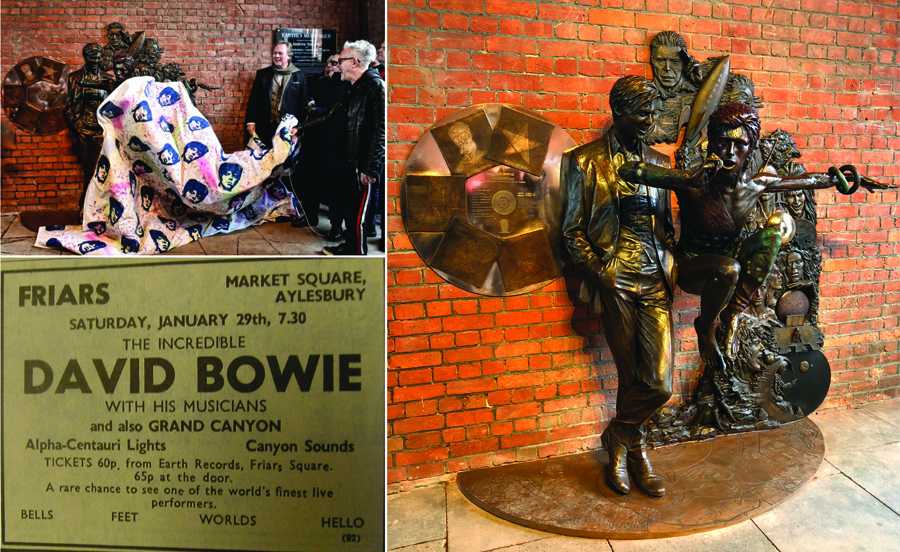AC-ET goes back to its roots in Aylesbury
- Details

Designed by Andrew Sinclair for Friars Aylesbury Community Projects, to celebrate David Bowie's music and local legacy in a permanent way, Earthly Messenger features Bowie as Ziggy Stardust and other characters from his career. A Bowie track is played at random on the hour every hour above the statue.
Unveiled on 25 March 2018, the statue also received extensive local, national and international media interest. It was followed by a special fundraising concert featuring Friars Aylesbury local heroes Marillion, Howard Jones, John Otway and the Dung Beatles.
David Stopps, music promoter for the Friars Aylesbury club - which today hosts events at The Waterside Theatre in Aylesbury - directed the sculpture project with his wife, Sue.
The club has a special connection with David Bowie, having hosted the worldwide debut live performances of his seminal Hunky Dory, The Rise and Fall of Ziggy Stardust and The Spiders from Mars albums at its former Borough Assembly Hall location in Market Square, Aylesbury during 1971 and 1972. As well as playing Friars five times, Bowie formed the Spiders from Mars in the club's dressing room and referenced Aylesbury Market Square in the first line of Five Years from the Ziggy album - 'Pushing through the Market Square, so many mothers sighing’.
Friars Aylesbury is also acknowledged as having played a role in the successful careers of such iconic British artists as Genesis, The Jam, The Clash, The Ramones and U2 to name just a few - as well as being a large contributor to the success of the original A.C. business in the 1970s. Known then as the Alpha Centauri Light Show / AC Lights, it provided the resident psychedelic light show for DJ support acts to the live music artists - including on the night of David Bowie's performance on 29th January 1972.
Friars Aylesbury and David Stopps gave A.C. the opportunity to network with the bands who performed there and their managers, leading to work with these bands on their subsequent tours.
40 years later, David Stopps contacted David Leggett, co-founder of A.C. and now executive chairman of A.C. Entertainment Technologies (AC-ET) as the company is known today, to see if it could donate and install a lighting system to permanently illuminate Earthly Messenger - the world's first statue of David Bowie.
David and AC-ET were keen to be involved in the project, to give something back to the Friars club and to the town of Aylesbury as acknowledgement of how important they were to A.C. in its early years.
AC-ET's project installations sister company, A.C. Special Projects Ltd (AC-SP) provided the solution after meeting with David Stopps and Aylesbury Vale District Council. To re-create the authentic look of David Bowie being lit on stage during performances by rock 'n' roll style PAR Cans, and to keep the lighting as discreet as possible, AC-SP specified Chroma-Q Color One 100X compact, IP65 rated, energy efficient LED PARs.
The statue is illuminated in a warm white colour temperature specifically chosen to complement its bronze finish. To comply with Historic England's requirements, the fixtures were carefully installed by AC-SP to blend in with the Grade II listed Market Square arches ceiling's listed wooden beams.
David Stopps says: "'A.C. Lighting' and Friars Aylesbury have a long and glorious history together going right back to the early seventies. We are extremely grateful to David Leggett and A.C. Special Projects for their enthusiastic support for this mammoth two-year project. 2019 will be the 50th Anniversary of Friars Aylesbury and we look forward to more collaboration with A.C. Lighting to celebrate that milestone."
AC-ET's David Leggett comments: "It's been a pleasure to be involved in this project. When I had the pleasure of working with David Stopps in the 1970s, he had a real talent for spotting up and coming artists, which often broke after playing at the Friars club. Like many artists who performed there, A.C. owes a debt to David, Friars and the town of Aylesbury for the support and opportunities they gave us in our early careers.”
(Jim Evans)












